While many Brass Bands have long histories, very few trace their origins back as far as Mosgiel Brass does.
History
The first Brass Band on the Taieri Plain was established by one John Iveson sometime in the 1860s. The band’s members and its activities were centered around the settlements of Woodside and Outram on the northwestern outskirts of the Taieri Plain. The West Taieri Brass Band continued for almost one hundred years before it was finally wound up.
East Taieri Brass Band
During its early history, the area now known as Mosgiel was referred to as East Taieri. In 1872, Mr Iveson perceived a need in the rapidly expanding town of Mosgiel and established another band, which was known as the East Taieri Brass Band. This is the band that eventually became what is now Mosgiel Brass.
During the next 150 years, the band underwent a variety of name changes in line with circumstances in place at the time.
Mosgiel Factory Operatives Brass Band
In around 1883, interest began to wane a little. As with many brass bands, the membership was largely taken from within local industry; particularly the Mosgiel Woollen Mill. When the band became less active, some of the players decided to purchase the instruments themselves in order to keep the group viable and they became known as the Mosgiel Factory Operatives Brass Band.
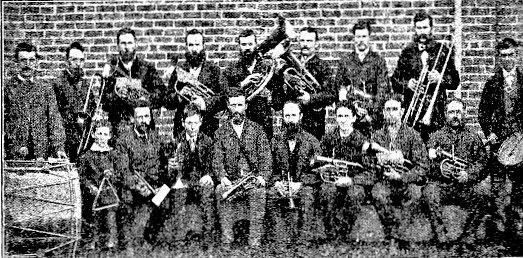
Mosgiel Garrison Band
Later, in about the mid-1890s, circumstances again changed and along with them the name of the band when it became the Mosgiel Garrison Band.
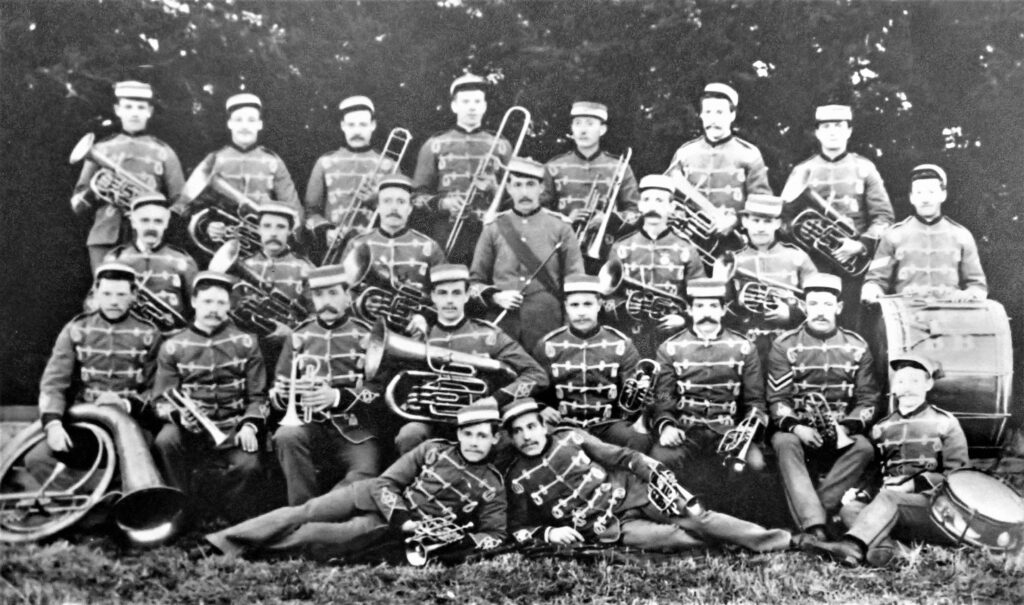
Mosgiel Municipal Brass Band
In May 1922, a letter from the then committee to the local council, successfully requested that the council support the band financially. As a consequence, a further name change was required, and the band became the Mosgiel Municipal Brass Band.
As with all bands, there have been periods when activities waned significantly, and in November 1924 the Band was (albeit briefly) wound up. After a very short hiatus, in February 1925 the band was reinstated again by the town’s Mayor Mr J P Wall, to ensure entertainment would be provided for the impending visit of the American Fleet in July/August of that year. This proved so successful, it was decided to continue again as the Mosgiel Municipal Band. The band made substantial progress and was well placed in the C Grade contest at the Dunedin Exhibition in 1926.
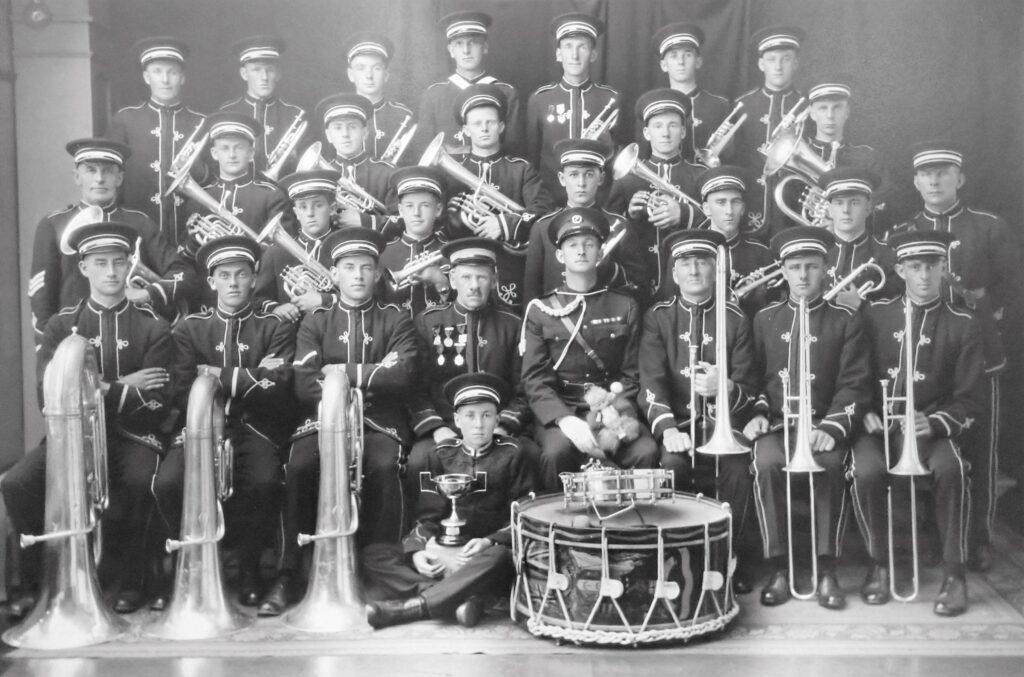
Otago Mounted Rifles Band
During WWII, the band was attached to the 5th Otago Mounted Rifles and performed for several years in khaki uniform as the Otago Mounted Rifles Band. When researching this band’s history, it became apparent that between 1921 and 1939 the was an Otago Mounted Rifles Band based in Oamaru. This band joined with Oamaru Municipal in 1939 and became the Oamaru Garrison Band. From contemporary reports it appears that after 1939 when the Otago Mounted Rifles Band was mentioned it was often followed by (Mosgiel Municipal). Following the war, the band’s name reverted to Mosgiel Municipal Brass Band.
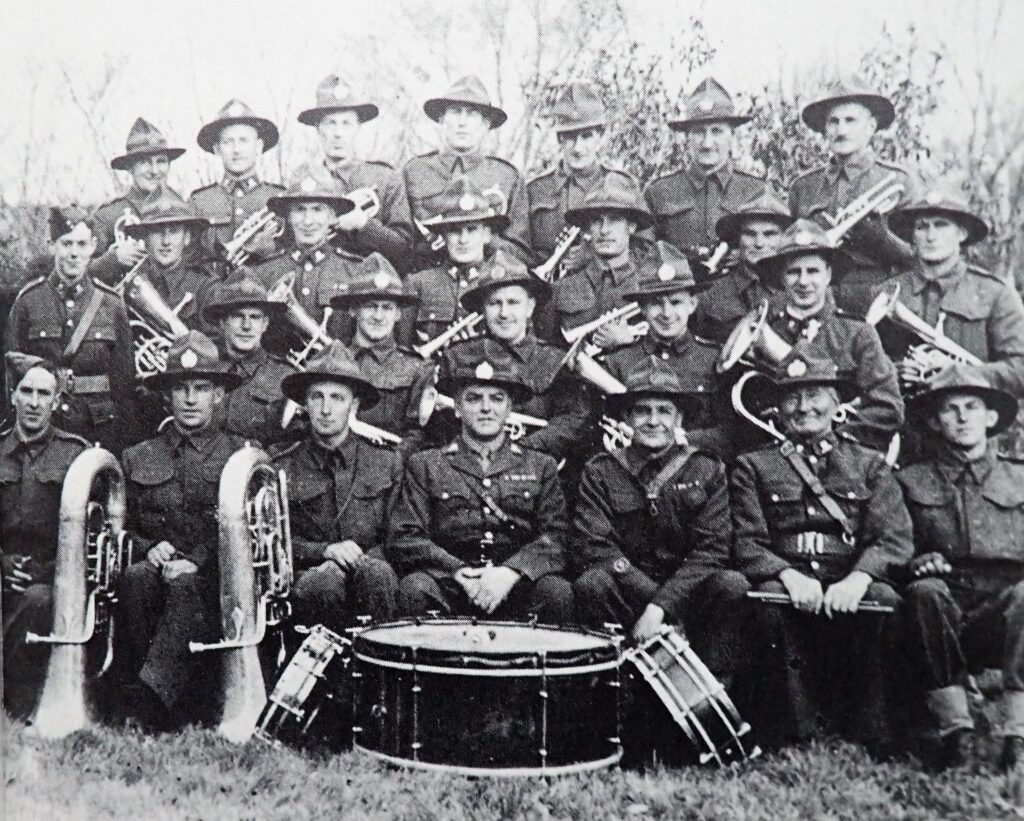
Mosgiel Municipal Brass Band (again)
After the war, when the band reverted to Mosgiel Municipal Band, they needed new uniforms as the Army ones had to be returned. Inquiries were made to the Air Department re surplus used Airmen’s uniforms, and in November 1947, 36 pairs of trousers and 36 jackets @ 22/6 a set plus 36 brass buckles @ 9d each were ordered. All but one of these duly arrived. Unfortunately, the gentleman with chest size 47½ inches and waist size 48 inches could not be supplied, although arrangements were made to send a uniform of the largest size available from the No 2 Stores Depot. All the uniforms were sent to the City Dye Works in Dunedin to be dyed Navy Blue.
Although the band continued to function, they were consistently short of players. By 1955 the band could not form a committee and were noticeably short of funds.
The Mosgiel Borough Council took over control of their financial affairs. Things started to improve in 1958 and by 1959 the mayor called a public meeting saying the band had made sufficient progress and could now set up a committee to control themselves.
RSA Mosgiel Brass
In 1968 the Mosgiel Municipal Band received the music and instruments that had been held in storage since the dissolution of the West Taieri Brass Band in 1952. For many years, the Mosgiel RSA made a generous financial contribution to the band each year. As council funding had long since ceased, in 1989 the band committee resolved to recognise its current financial support and became RSA Mosgiel Brass.
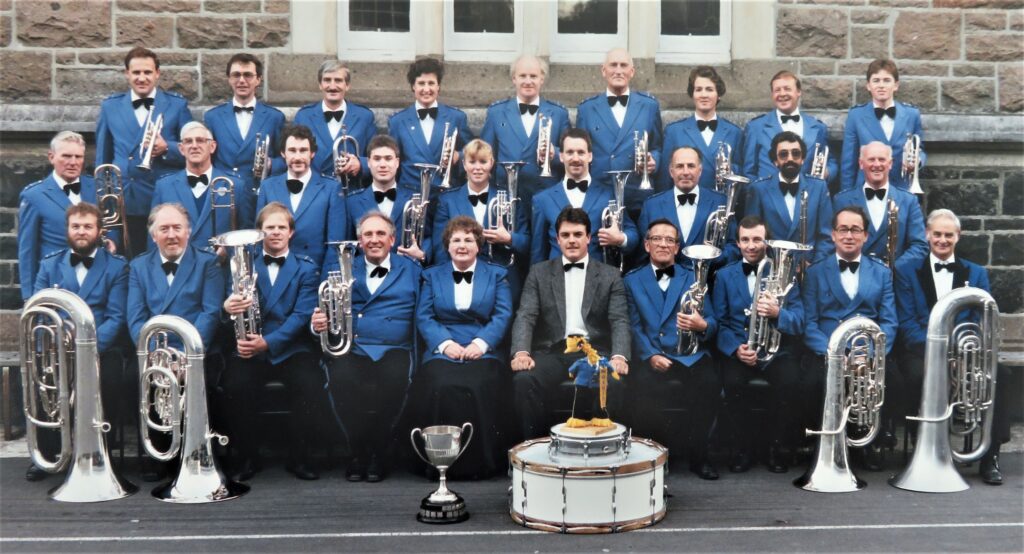
Mosgiel Brass.
Then in 2003, with running costs continuing to rise, the RSA’s on-going support was not enough to sustain the band without supplementation, especially since there was now an urgent need to upgrade some of the (expensive) instruments. The incumbent committee recognised there was also a need to regularly apply to various charities and public funds for additional, targeted, funds. After much discussion and in consultation with the RSA, a decision was made to change the name to simply Mosgiel Brass.
Recent highlights
The band regularly competes in the C grade at the OSBBA annual contest, South Island National Contests and (occasionally, when funds allow) at north island Nationals. Individual players also regularly compete in solo and party events.
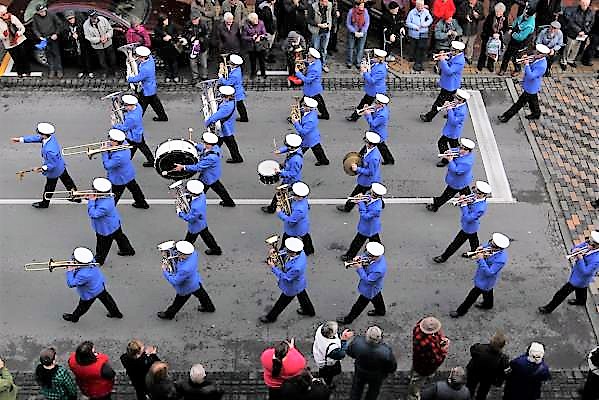
Mosgiel Brass is unashamedly community-focused. Since its inception, the band has provided entertainment at local functions. The “Papers Past” website is liberally sprinkled with contemporary reports of the band, whatever its name was at the time, playing at galas, gatherings, and concerts as well as regularly contesting.
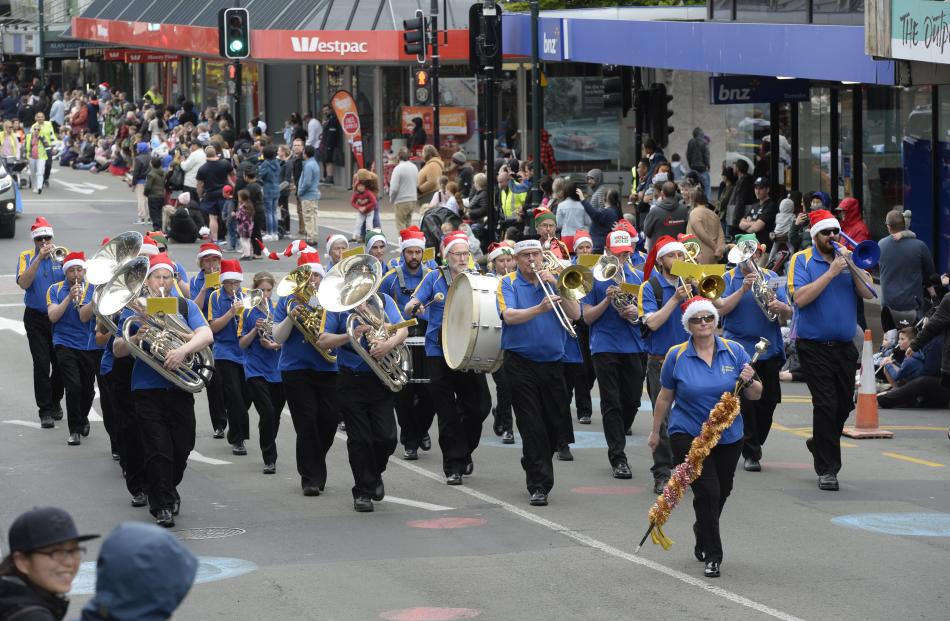
A century and a half later, Mosgiel Brass is still frequently seen in the community (global pandemics allowing). There are, of course, the bread and butter annual events such as ANZAC day – where the band provides marching and remembrance assistance – and the city’s Santa Parade. The band also regularly provides concerts; either at informal venues in public places such as the city botanical gardens or at more formal halls and concert chambers. Typical one-off playouts over the years have been as varied as leading the 2000 America’s Cup parade in Dunedin; playing on the platform several times during the centenary of Dunedin railway station; leading the Grand Parade at the local A&P Show; participating in the centennial concert of the Dunedin RSA Choir where the band was both accompanist and a featured artist; surprise ‘flash dance’ style interruptions at private parties; providing hymnal accompaniment at the Police Remembrance Day service; and a cameo role in an Air New Zealand safety video. A significant fundraising activity in recent years has been busking carols leading up to Christmas at the Otago farmer’s market, which is always very well received.
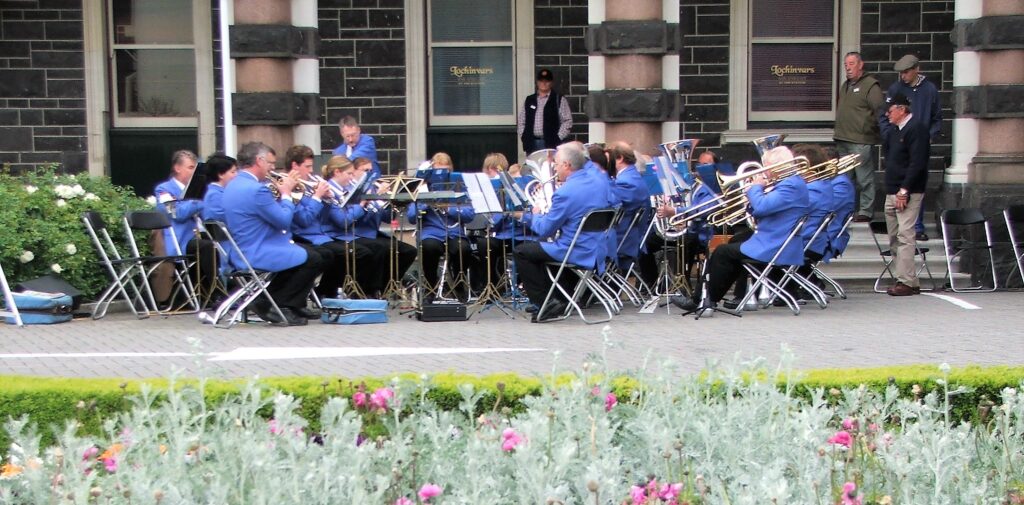
Mosgiel Brass has a reputation of providing a friendly ‘family style’ environment. Current players range in age from 11 to over 80. The band has nurtured many young players who have gone on to play in A-Grade bands and in the Services bands and a number of junior players have been selected for the National Secondary Schools and/or the National Youth Bands; some for multiple years. Often, visiting players join in on practice night, either to ‘keep their lips in’ or because they are passing through town and just happen to have an instrument with them. The band regularly has existing players who are new to the district join the ranks, more often than not citing the band’s collegial reputation as the reason for seeking it out.
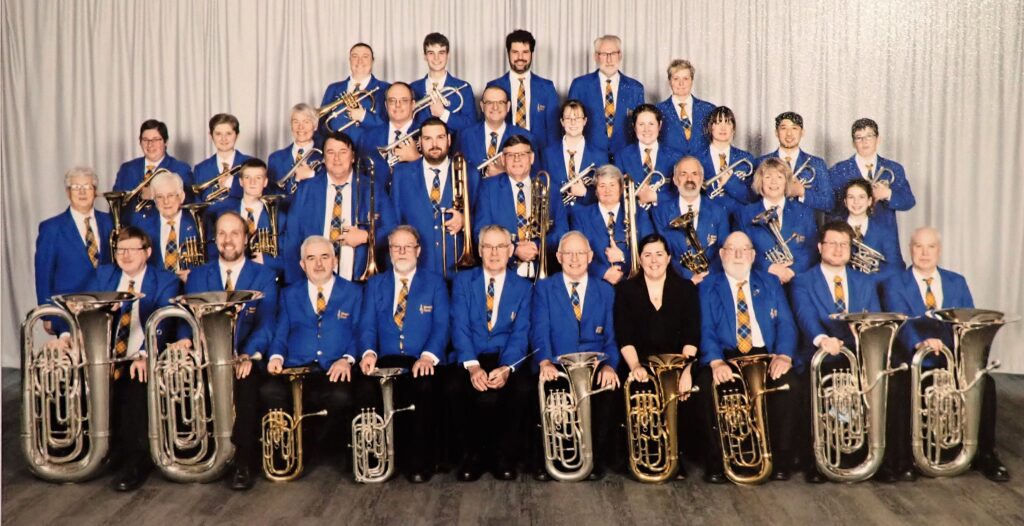
Two men separated by 150 years
As it approaches its sesquicentennial celebrations, Mosgiel Brass will always be indebted to two men.
The first is John Iveson. Mr Iveson saw the need for a second band on the Taieri (having already started the first) and his forming of the East Taieri Brass Band in 1872 is why Mosgiel Brass is celebrating in 2022. In October 1873, Mr Iveson was entertained by members of the band at Snow’s Hotel in Mosgiel where he was presented with a “handsome pianoforte in walnut” for his work in “commencing and carrying on the East Taieri Brass Band for the last eighteen months”.
The other is the band’s current musical director, Philip Craigie, QSM.
Philip’s father, John, was a playing, and committee, member of the band for many years. By 1966 Philip was an accomplished junior cornet player. Then, as a music student at the University of Otago, Philip became the band’s conductor. At this time, he was arguably the youngest conductor of a contesting brass band in the country. In its centenary year (1972) Philip took the band to the District Contest in Oamaru where they won the D Grade. Following his graduation, Philip moved to Christchurch, for his employment as a teacher, where he was associated with Woolston Brass Band. By the 1990s, Philip was back in Mosgiel and in the band as a cornet player. In 1992 the conductor’s position again became vacant, and Philip has held the role of musical director ever since. As we celebrate 150 years, Philip’s daughter (a former member of the National Youth Brass Band) is principal cornet. Another daughter plays trombone, his son (also a former member of the National Youth Brass Band) is a percussionist and two of Philip’s grandchildren currently play in the band with a third almost ready to join the ranks.
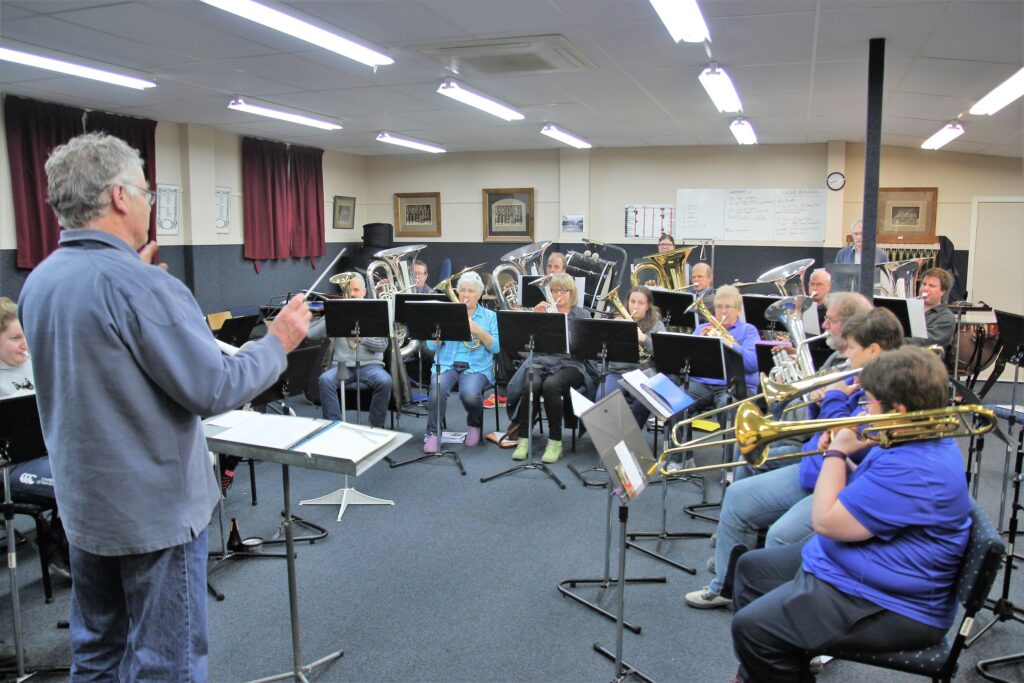
The future
Currently, Mosgiel Brass has thirty-nine playing members. It is a vibrant group of players who enjoy gathering socially as much as they enjoy playing together. On any regular rehearsal night, nearly every one of those players will be present.
Brass Bands rely on enthusiastic fresh players to come through and replace those who ‘run out of puff.’ Mosgiel Brass attracts players via several avenues. Some come from other bands having moved to the district and been attracted to the band by its reputation. It is not unknown for an enthusiastic young person (or in fact a parent) to see the band in action and to make contact asking how a learner can become involved. Some school-age learners are recommended by their itinerant teachers and others make contact purely ‘out of interest.’
There is a small group of very enthusiastic young players currently having lessons independent of the Band environment. When their teacher considers that they are ready to play in an ensemble, they are invited to come along to band nights for a taste of the camaraderie and the musical satisfaction of playing in an ensemble that the Brass Band offers. After that taster they almost invariably join the ranks.
The future is in their hands, and right now, the future of Mosgiel Brass is looking good.